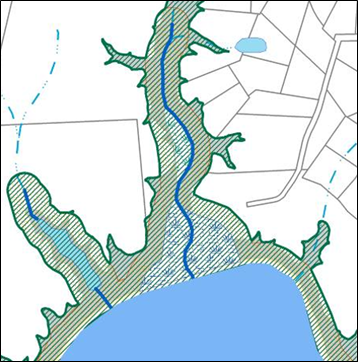Fairfax County, Virginia’s Board of Supervisors approved amendments to the Chesapeake Bay Preservation Ordinance (CBPO) on October 8, 2024. The amendments provide “provisions for the adaptation to sea level rise and storm surge, and the preservation of mature trees” and were effective the next day. Wetland Studies and Solutions, Inc. (WSSI) is navigating these changes with clients whose projects include activity in the Resource Protection Area, the designated environmentally sensitive area protected Virginia’s Chesapeake Bay Preservation Act.
Note that these changes are pursuant to actions taken in the General Assembly in 2020 and approved by the State Water Control Board in 2021 to promote coastal resilience adaptations to mitigate impacts of sea-level rise and climate change, and to reinforce the importance of mature trees for water quality protection. We anticipate other local governments will have similar amendments moving forward to maintain compliance with the Chesapeake Bay Preservation Act.
What is a Resource Protection Area?

WSSI’s illustration of Fairfax County RPA. (copyright Wetland Studies and Solutions, Inc.)
Virginia’s Chesapeake Bay Preservation Act, which was enacted in 1988, requires all Virginia “Tidewater Localities” to protect water quality by limiting land use in the first 100 feet from tidal shores, tidal wetlands, and perennial waterbodies and these features contiguous non-tidal wetlands. The local governments were tasked with implementing the regulation with their own ordinances.
Fairfax County’s Chesapeake Bay Preservation Ordinance amendments increase the environmental protections afforded land characterized by one or more of these features: (1) tidal shore, (2) tidal wetland, (3) waterbody with perennial flow, (4) nontidal wetland connected by surface flow and contiguous to a tidal wetland or waterbody with perennial flow, and (5) major floodplain that buffers those features, and (6) any land within 100 feet of (1) – (4).
Fairfax County’s CBPO Amendments
The County’s updates address tree protections and living shorelines. We have broken down the changes below, but recommend you review your specific project with your WSSI project manager.
Trees and Vegetation in the RPA
- Mature trees must be preserved and protected. This is not a new requirement in Fairfax County, but the amendment codifies it for RPAs.
- When tree planting is proposed in the RPA, the use of native trees is strongly preferred.
Nature-Based Activity in the RPA
Nature-based adaptation activities are allowed in the RPA, subject to specific criteria and limitations regarding the use of fill. All nature-based activities in the RPA must:
- Comply with other local, state, and federal laws protecting the features of the RPA including wetlands and perennial waterbodies;
- Minimize land disturbance; and
- Comply with Fairfax County CBPO fill conditions.
Living shoreline projects may now qualify for exemption from the Water Quality Impact Assessment (WQIA) process, assuming they meet the above criteria and they establish or maintain vegetative buffers on their landward edge.
All Activities That Require a WQIA
Any activity that requires the submission of a WQIA must now include several new elements in the WQIA including:
- A Resilience Assessment
- Impacts to the RPA buffer function
- Measures to address the potential impacts to resilience and buffer function
While these added measures will primarily affect those projects in tidal areas and floodplains, it is an additional level of effort and cost to applicants to address these new items.
Fairfax County’s Timing
The amendments were effective immediately, and apply to all plans and applications submitted after their adoption. Plans under review prior to adoption were given 6 months to gain approval, after which time they are subject to the new amendments.
All previous approvals for WQIAs and RPA exceptions and exemptions will remain valid through their approval expiration dates.
WSSI Can Help
WSSI staff have extensive experience with the Fairfax County CBPO and can provide guidance for your projects, and on the implications of these amendments. If you have questions about how the amendments to the CBPO may impact your current and future projects in Fairfax County, please contact your WSSI project manager or the staff listed below.
We are experienced with all of the local CBPOs and their variations and welcome the opportunity to work with you to ensure your projects are viable. Gainesville staff know Fairfax County and the Northern Virginia local CBPOs. Staff in our Virginia Beach and Richmond offices are available for your questions on Tidewater and Central Virginia projects.
